- Home
- M. K. Hume
The Poisoned Throne: Tintagel Book II Page 16
The Poisoned Throne: Tintagel Book II Read online
Page 16
Without taking his eyes away from the priest’s face, Constantinus slowly raised the terracotta beaker to his lips and drank deeply. The water was sweet and clean, and had the faintest after-taste of iron beneath its refreshing coolness. Constantinus and Paulus both drank their beakers dry, after which Gregory refilled the drinking vessels with a cheerful smile.
Two of the brothers entered the refectory on silent, sandalled feet. The first carried a platter of plain wood which bore a loaf of newly baked bread and a knife. The second man juggled another platter with two bowls of the familiar terracotta, two spoons, another bowl containing sweet honey on the comb and a tiny wooden jar of salt. The eating bowls were filled with warm porridge and the Romans’ mouths immediately began to slaver.
‘Try a pinch of salt with your porridge,’ Gregory advised his guests. ‘It adds to the taste of the food, even when new honey is used to sweeten the meal. God has endowed our community with a precious gift of healthy and tasty food, whether we be rich or poor. I beg you to share the fruits of our toil and His generosity.’
Each man thanked Father Gregory once again and resumed eating with obvious pleasure. Paulus was well used to gritty porridge without the benefit of either salt or honey, so he was amazed at the difference these two precious luxuries made to the taste of the food.
Constantinus’s food experiences were wider than those of Paulus but, once he had eaten and drunk his fill, he was hard-pressed to remember a meal that he had enjoyed more. Delighted, he said as much to Father Gregory, who flushed with pleasure.
‘I thank you on behalf of my brothers who labour so willingly for the glory of God. As you can see, we live simple lives here. Our community accepts that Jesus of Nazareth travelled here with Joseph of Arimathea, before he began his ministry in those far-off days when the Romans first came to the shores of Britannia. My people are as one with these lands that bore the feet of Our Lord, Jesus, so Glastonbury has a special aura that tells us we live in a place that is truly blessed.’
‘I agree with you that Glastonbury is certainly a special place that has no equal in my experience,’ the centurion responded carefully. ‘But there is one thing I don’t understand. You said you had been expecting us, Father. Did Drusus not tell you about our journey during the short time he was here before our arrival?’
‘Of course. But we had already received word of your journey.’
‘But how? We left Corinium in secrecy and wouldn’t have diverted to Glastonbury if our wagon driver had not been wounded. We would have taken a different road into the south, one that would take us directly to our destination.’
At that crucial point in the conversation, one of the brothers who had served the meal knocked gently on the door frame. The monk’s face held a concerned expression, so Gregory rose to speak to him quietly. Then, when the brother took his leave, the priest returned to the table and seated himself carefully.
‘Adolphus sends word that your man is gravely ill. If you wish to see him, perhaps you should do so now. My healer believes his life is in the balance.’
‘Is Lady Severa aware of the situation?’ the centurion asked crisply, all thoughts of his previous question driven out of his head by the urgency of this new difficulty.
‘The lady is with him now. It appears she refused to leave him – even when Adolphus cut into Cael’s chest to remove the arrowhead. She believes that your driver needs a familiar face to remind him that life is sweet and good. She is strong-willed, that little one, but she has no idea what she is facing.’
‘Then I’ll join her!’ Constantinus said decisively before turning to speak to his decurion.
‘See to the men in their billets, Paulus. They may have some rest while we remain here, but I’d like to make sure they’re kept occupied while we are enjoying the good father’s hospitality. Perhaps our men could provide some assistance to the brothers who work in the fields, if the abbot is agreeable. There’s little else we can do until such time as Cael’s fortunes are decided, one way or the other.’
Constantinus followed Father Gregory out of the refectory and along the neat paths that ran in a network connecting the community’s buildings to each other. Tidy patches of vegetable gardens were laid out between the buildings, the produce so lush and well maintained that Constantinus was transported back to his childhood and the farming existence that had been his lot in life. Fruit trees, shrubs and climbing vines had been planted to act as windbreaks as well as providing a food source for the community.
The hospice was some little way from the refectory, but the site had been selected to take advantage of a grove of apple and pear trees that sweetened the air. The sick and the dying could rest in a quiet, sweet place where the only sounds were the breezes and the movement of foliage in the trees.
Constantinus felt the peace of this quiet place soak into his soul as soon as his feet crossed the simple stone threshold.
The space used to house those members of the community in need of medical treatment was small, sweet-smelling and consisted of one large room for the patients and two smaller annexes used to store supplies and provide an overnight sleeping space if nursing supervision was required. Two patients could be housed in the warm hospice with relative comfort and, unlike the spartan accommodation favoured by members of the religious community, ailing patients were provided with woollen pallets and a number of warm blankets to ease the pains of aching bones or the final hours of the dying. Every surface in the rooms was spare and clean, for the hospice’s fittings were scrubbed regularly by several women who laboured with Father Adolphus to ensure that patients would survive, if such was God’s intention. If the patient was dying, a woman’s hand smoothed their brow and another woman sat by the pallet and offered the comfort of a mother until death came. In the good father’s care, the ill were never alone.
In the annexe used as a storeroom, Adolphus kept powdered herbs, tinctures, various pain-killers, the tools of the surgeon’s trade and the mortars and pestles used for grinding roots and other vegetable matter into pastes. Some of the dried objects stored on the healer’s shelves caused Constantinus to repress a shudder when Father Gregory showed him the facilities available to the healer.
At this moment, however, all the attention of Father Adolphus and his women was focused on the pallet where Cael was lying in a profound sleep.
Severa was seated on a stool by the pallet, holding Cael’s hand, although one glance at the driver’s flushed face and his sweat-drenched flesh told Constantinus that Cael was oblivious to her presence.
‘How is your patient, mistress?’ he asked in his kindest voice to quash any residual irritation that might lie at their enforced delay. ‘Has his condition changed since I last saw him?’
‘Father Adolphus removed the arrowhead as soon as we arrived. He says that Cael is fortunate that the head wasn’t barbed and poisoned, although I doubt that Cael would care much either way. The good father gave him a soporific to put him to sleep, so he is hoping that he might wake in a few hours. I’ve promised Father Adolphus that I’ll bathe Cael regularly to keep him cool once his temperature begins to rise.’
Then Severa blushed at her innocent slip of the tongue. ‘Of course, one of the women here washes his whole body. But the pair of them, Mara and Hisse, work so hard that I’m happy to ease their labours by washing poor Cael’s face, neck and arms to lower his temperature.’
Severa glanced down at her shoes. When she raised her face again, Constantinus could see that her eyes had filled with tears.
‘Cael thinks he’s going to die, but I’ve sworn that I’d do everything in my power to save him if it is at all possible. And I will.’
The comatose man’s skin was blotched with fever as he stirred and mumbled in a restless sleep. The top half of his chest was swathed in bandaging and Constantinus was surprised to discover that the driver had a strong musculature, but then realis
ed that a wagon-driver would probably need upper-body strength to control a team of horses or oxen.
‘He’s a strong man, but I believe that his wound might have been untreated for too long. He still has some chance, Severa, but you must prepare yourself for the possibility that he’ll die.’
‘I’ve tried to, but someone among us should believe that the man will survive his wounds. Cael was wounded because of me, Centurion.’
‘Don’t be foolish. Those men who triggered the ambush are the guilty parties, not you.’
‘True, but I can’t convince myself in here.’ She thumped her breast with her clenched fist.
Cael lay between them like a marble effigy. Constantinus wanted to comfort Severa, but he knew that there was a line that he wasn’t permitted to cross.
‘Send word to me if Cael’s condition worsens, mistress. In the meantime, I must insist that you rest and eat. If you should become ill we’ll have further delays inflicted on us. In the meantime, I must see to my command and make my preparations for the rest of our journey to Tintagel, so I’ll bid you good day.’
Once outside the hospice, the centurion drew Father Adolphus aside and asked him to elaborate on Cael’s condition and prognosis. ‘I’d rather you didn’t give me any comforting ambiguities, Father. I’m a fighting man, so I prefer accuracy to kindly lies and I must plan the movement of my column over the next few days. Can you make an educated guess as to Cael’s chances? I assure you I won’t discuss your prognosis with the lady.’
‘I really don’t know,’ Adolphus replied. ‘The fever might continue to rise and that would surely kill him, or it can break and the man will live. I will do all I can, but his fate will remain in God’s lap. Certainly he has been fortunate so far in that he has had you and Lady Severa to care for him and bring him to our community.’
‘Aye, he was fortunate that Lady Severa took a liking to him. I can’t say I’d have gone to this trouble if it weren’t for her insistence, because Roman legionnaires are usually assisted to enter the shades when they are as sorely wounded as this man.’
Father Adolphus nodded crisply and made his apologies before returning to his patient. At a loose end, Constantinus stared back towards the hospice where the priest and the girl were already soaking cloths in cold water to make compresses for Cael’s feverish head.
Constantinus spent the rest of the day walking all over the grounds of the enclosure. Its agricultural wealth was significant, and he would happily have sworn that he had never seen a more efficiently run farming community, but he realised that, as he had first thought, the walls of the settlement would never repel attackers.
The hours passed pleasantly.
A bell rang from somewhere in the settlement, sweet and low, inviting the workers in the fields to pick up their baskets and their hoes and begin the walk back to their living quarters. Their day of labour was drawing to a close, although the light was still bright. The quiet patterns of country life had already begun to embrace many of the Romans, filling them with nostalgia. But Constantinus’s thoughts and anxieties dwelt on the chances of his enemies regrouping or being reinforced, while his own column whiled away the hours in the peace and comfort of Glastonbury.
‘Lord, make Your decision on how long we are bound to stay in this strange place in Your own good time but, please, if You care for the devout members of Your flock, make our stay here as brief as possible,’ he prayed into the evening breeze.
Then, with a shrug of acceptance of the inevitability of fate, he joined Paulus to carry out a snap inspection of the horses and his legionnaires.
Cael lived through the night. Against all expectations, he lived through the next day too, although his temperature stubbornly refused to fall and he continued to rave during a troubled sleep that frightened Severa by its intensity.
‘Don’t be disheartened, my dear,’ Father Adolphus urged with a bracing smile. ‘The time when we must become truly concerned is if he falls into fits. If fitting does occur, we will know that his body is being attacked by fires that are present in his wound. At the moment, his spirit is fighting the poisons that lie at the heart of the infection, so I remain hopeful.’
Father Adolphus attempted to convince her to rest, but Severa laboured on, pitting all her womanly strength against the power of the infection.
Constantinus and Paulus chafed under the inactivity forced on men of action. They curried their horses and exercised them, cleaned their armour and sharpened their weapons, but the hours seemed to drag on and on without any respite.
The legionnaires spent their free time exploring the lands that lay in the vicinity of the religious community, including the villagers’ cottages clustered around the margins of the church’s enclave. Constantinus climbed the peak of the tor and discovered the ruins of the crude communication tower he had remarked on when they first approached Glastonbury.
The Romans also found the point at which an underground river came out of the ground, including a special chamber below it where deposits of minerals dripped down from the ceiling like the teeth of some gigantic carnivore. A pond filled most of this cavern, a stretch of water that was as red as drying blood. Yet, when Constantinus dipped his cupped hands into the cold fluid, the water that slid between his fingers was as clear as the finest Roman glass.
A short ride away, they discovered the last traces of an abandoned village that had been erected on high wooden stilts, as if the original houses had stood over large sheets of water. The waters must have receded, leaving marshy ground behind, along with the mute evidence of sea shells still trapped in the mud of ages.
Constantinus struck out with his sword at one of the uprights of timber that jutted out from the ground like a single fingerbone. Much to his surprise, it made a sound like metal striking stone. A close examination showed that the timber had been cut crudely and then driven deep into the mud that would have lain below the waters of the inland sea. Over the years, exposure to the elements had given these poles the consistency and hardness of granite, as if some gorgon had turned them to stone.
‘Glastonbury is really very, very strange,’ Paulus repeated.
On one of the hills close to the settlements, a feature that was shaped like the curved spine of a fish, Father Gregory had taken the two officers to a small tree that had grown crookedly on the site. Then he told his guests of a local legend that a remnant of the Crown of Thorns had been carried across the waters and planted here after the death of Jesus in Jerusalem.
Constantinus and Paulus stared at the small tree with varying degrees of incredulity.
‘I won’t accept that this scrawny specimen grew from a staff or a crown of thorns,’ Constantinus muttered doubtfully. ‘It sounds like so much wishful thinking to me.’
‘But we’ve seen stranger things,’ Paulus responded sardonically. ‘I still remember the talking tree we saw when we were in Gallia? To this day, I still believe it was an old druid trying to frighten the villagers into giving him food and shelter. Yet, there’s something about the tree that Father Gregory showed us that was familiar to those legionnaires who served in Jerusalem. It certainly has vicious thorns . . . and it doesn’t look like any trees I’ve seen in Britannia.’
‘When it comes to religion, we’re all credulous fools,’ Constantinus replied. ‘I’ll believe in the tree when it bears the staff of Joseph of Arimathea as fruit.’
Cael lived through the second day then, on the third day, surprised his nurse when he woke from his long and feverish dream.
At the same time, Constantinus, Paulus and three of the Roman cavalrymen were carrying out a reconnaissance along the long marshy valley that stretched into the south when they saw a plume of smoke rising from a low rise roughly parallel to their position.
‘That looks like a signal fire, sir,’ Paulus warned, as the small patrol came to a halt. ‘What are your orders?’
‘We could be riding into a trap, sir.’ Paulus’s eyes swivelled from the near side of the slope to the hills on their left.
‘Without Severa in tow, we’re just a difficulty that must be killed off when we are prepared to engage with them. With luck, they’ll abandon their observation post rather than risk their troops in a minor engagement. Even if Conanus has received reinforcements, Armorica is far away and he’ll have difficulty getting more men.’
Paulus chewed over Constantinus’s answer as he followed his centurion towards the hilltop and the grey feathers of smoke that were dissipating on the breeze.
The riders found long grasses thick with buttercups and other wildflowers as they approached the top of the treeless hillock. With the horses’ hooves sending clods of earth flying, the cavalrymen galloped to the site of the drifting smoke to find an abandoned fire pit that had been erected at the highest point. There was no indication of an enemy presence on the hill, which was bare of all cover.
As Paulus sent his three cavalrymen in separate directions to check on the possibility of ambush, Constantinus directed his horse towards the still-smouldering warning beacon.
The fire had been set in a simple circlet of stones prised out from the soil of the hill. He could see evidence of at least two riders who must have been watching the Glastonbury settlement from this vantage point, which overlooked the track leading to the south; the Romans must have been observed from the moment they left the settlement.
Constantinus looked southward, shading his eyes with his hand.
‘I just saw a flash of sunlight on metal,’ Paulus called from behind him. ‘There are also signs of movement among those trees that line the hills to the west.’

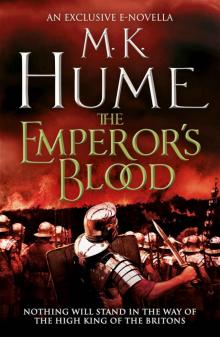 The Emperor's Blood (e-novella)
The Emperor's Blood (e-novella)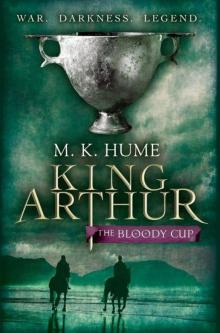 King Arthur: The Bloody Cup: Book Three
King Arthur: The Bloody Cup: Book Three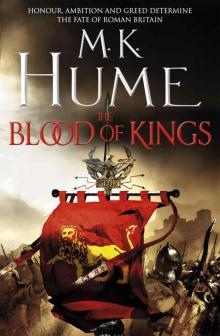 The Blood of Kings: Tintagel Book I
The Blood of Kings: Tintagel Book I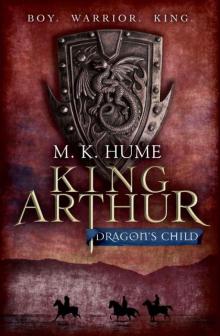 King Arthur: Dragon's Child: Book One (King Arthur Trilogy 1)
King Arthur: Dragon's Child: Book One (King Arthur Trilogy 1)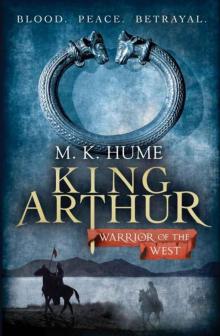 King Arthur: Warrior of the West: Book Two
King Arthur: Warrior of the West: Book Two The Storm Lord
The Storm Lord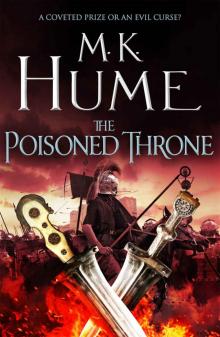 The Poisoned Throne: Tintagel Book II
The Poisoned Throne: Tintagel Book II![M. K. Hume [King Arthur Trilogy 04] The Last Dragon Read online](http://i1.bookreadfree.com/i2/04/07/m_k_hume_king_arthur_trilogy_04_the_last_dragon_preview.jpg) M. K. Hume [King Arthur Trilogy 04] The Last Dragon
M. K. Hume [King Arthur Trilogy 04] The Last Dragon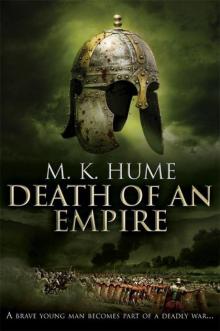 Prophecy: Death of an Empire: Book Two (Prophecy Trilogy)
Prophecy: Death of an Empire: Book Two (Prophecy Trilogy)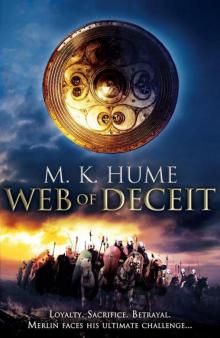 Prophecy: Web of Deceit (Prophecy 3)
Prophecy: Web of Deceit (Prophecy 3)